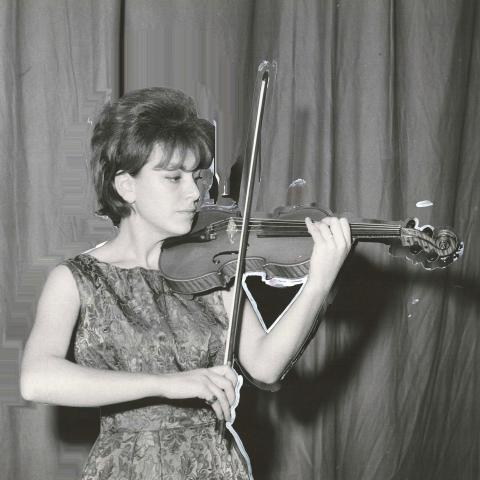Bice Antonioni
Beatrice Antonioni is internationally known for her activity as a soloist, performer of chamber music, teacher and recording artist. After completing her musical studies, with honours, under the guidance of her father, she continued her training in Violin and Chamber Music in Rome, at the "Accademia Nazionale di Santa Cecilia", in Siena, at the "Accademia Chigiana", and later with Remy Principe and Henryk Szering. She won prizes in the "Premio Paganini" International Violin Competition in Genoa and the first prize in two national competitions: "F. Geminiani", held in Lucca, and "Città di Vittorio Veneto" and took part, still very young, in a tour in the USA with the "I Musici" Ensemble.
An intense career as a soloist saw her involved with all the most important concert organizations and International Music Festivals, both in Italy and in a number of other European countries, as well as in Asia, the USA and South America. She has made various recordings as a soloist for a number of Italian, European and American Radio and Television companies.
For many years now she has also been playing chamber music in addition to her activity as a soloist. She has recently recorded a CD of Karol Szymanowsky’s Second Violin Concerto and the Concertos of G. Tartini. Her love of teaching, along with her thorough knowledge of the solo and chamber repertory, also involves her in a number of specialization courses and master classes in Italy and abroad. She is a teacher at the specialization courses for the violin at the "Accademia Nazionale di Santa Cecilia" and is often a member of the jury for national and international music competitions. Her many pupils who have won prizes include Massimo Quarta, winner of the first prize in the "Premio Paganini" violin competition, held in Genoa in 1991. She plays a 1741 Montagnana violin, which she alternates with a 1680 "D’Annunzio-Baccara" Stradivarius.



To think of Premio Paganini is, to me, to go back to the memories of my musical life. Only very few contests make me feel this way. I believe that any "complete" violinist has taken part in this competition. In the generous Genoa I had the chance to experience the challenge, the responsibiliy of the Jury and the deep emotion of seeing one of my students, Massimo Quarta, living my same experience as a young violinist, when he was awarded with the First Prize in 1991. The Premio Paganini stands not only for an important memory, but also for the real evidence of how history - in this case the history of music - needs leaders, although names and faces change. And Genoa can still discover them.